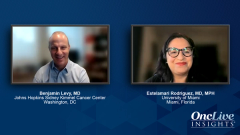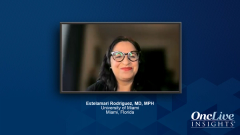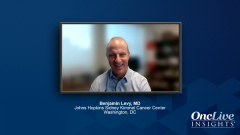
Evolving Field of Molecular Testing in Non–Small Cell Lung Cancer
Expert oncologists reflect on the current state of molecular testing in patients with non–small cell lung cancer and how it has impacted treatment pathways.
Episodes in this series

Transcript:
Benjamin Levy, MD: Hi, I am Dr Benjamin Levy. I am an associate professor at the Johns Hopkins School of Medicine, and the clinical director for the Johns Hopkins Sydney Kimmel Cancer Center [in Washington, DC], and the National Capital Region at Sibley Memorial Hospital.
Estelamari Rodriguez, MD, MPH: Hi, I’m Dr Estelamari Rodriguez. I am an assistant professor of thoracic oncology at the University of Miami [in Florida], and I am co-leader of the thoracic site disease group and clinical trials here in the South Florida area.
Dr Levy, why is it important to test for biomarkers in patients with lung cancer?
Benjamin Levy, MD: I think we’ve come a long way in this field. When I started, there were 3 drugs for lung cancer. We have evolved significantly, not only therapeutically, but more importantly perhaps, in the diagnostic algorithms that exist that create the framework for these new therapies. We now know that lung cancer is not just one disease, it is separate diseases. And we can parse out, at least nonsquamous non–small cell lung cancer [NSCLC], into these distinct molecular subsets and wed them to genotype-directed therapies or targeted therapies. But the only way we can do this is if we do what’s called molecular testing. This is just a way to unearth the genomic alterations or the DNA makeup of lung cancer. And by doing that, we are able to find these alterations that we can wed to targeted therapies.
I think we know that patients who get targeted therapies live longer, and they have better disease control. Perhaps underrepresented in the literature, [they have a] better quality of life. So, this is critical for us to do. It’s something we should do with all of our patients. We need to do molecular testing up front for all of our patients, both in the advanced stage, and dare I say, early stage. There are different ways to do that, so maybe we can talk about that, Dr Rodriguez. We sometimes think about the interrogation of NSCLC, classically by tissue. But we know that we can do both, now liquid biopsies, which sounded like science fiction 10 years ago, and tissue biopsies. Can you walk us through what you do and which biomarkers you are usually testing for?
Estelamari Rodriguez, MD, MPH: You are correct to say that obviously, biomarker testing is the standard today because we’re unable to select the best treatment for patients unless we understand this critical information. Liquid biopsies have really helped us in this process because as you know, many times patients are unable to get good biopsies to get tissue testing. Having the option of collecting a blood test at the clinic, and sometimes we send a phlebotomist to the house to do the test before we meet the patient, allows us to do 2 things. One is that we can get results in some of our patients with advanced disease early. The liquid biopsy returns, and the turnaround from that is around 7 days, and that allows us to get more information when we need it. But I think the other part is that we have seen there’s a very high concordance between tissue and liquid, so when you find a positive test in the liquid, we can make a decision with that information. You don’t need to wait for more testing. That allows us to offer patients options early.
We have also found that some of the tests, specifically the liquid biopsies, are very good at detecting RNA. There’s some information that could be picked up in the blood that you might miss in the tissue, and vice versa. What I do with my patients is, when I meet a patient with stage IV [lung cancer], which is advanced, getting this information about biomarker testing is important for patients who have actionable driver mutations. We know that those patients will do better with the targeted therapy up front. But we also know that patients who need immunotherapy and have targeted actionable mutations, if they get exposed to immunotherapy first, before they get the properly targeted therapy, can have excess toxicity. So it is important for all patients that we get this fast, in a timely fashion, and we get a comprehensive test.
The biomarkers we’re looking for, the field is evolving because a lot of our testing was concentrating on stage IV disease. But we now need this information to make decisions about immunotherapy in the neoadjuvant setting, which is before surgery. We also need the information now, based on the ADAURA trial, for patients in the adjuvant setting after surgery. At least for EGFR and ALK mutations, these are tests that are important to recognize early. We are testing all our patients in stage IV, and we are making decisions now on patients with early stage disease. The NCCN [National Comprehensive Cancer Network] guidelines recommend broad molecular profiling, next-generation sequencing, which will be a very comprehensive profile of genes. Now, the actionable biomarkers we include in our algorithms are about 10 mutations. One that is critical is PD-L1, which determines and marks who is going to respond to immunotherapy alone. But we have EGFR, which is the more common mutation, with KRAS G12C, ALK, ROS, RET fusions, NTRK fusions, MET. Then there are new mutations that are important because we have known about them, but it hasn’t been until recently that we have treatments for these patients.
For my patients, when I meet them, I do a liquid biopsy to get information fast. Then I also try to get a tissue diagnosis because if the liquid biopsy comes back negative, there’s still a chance you’re missing mutations. We do them not in tandem, we do them concordantly, to save time and get patients to a treatment. I think we need to be more comprehensive so we don’t leave any mutation that is there unchecked and untreated. There is, however, a higher rate of some of these mutations in adenocarcinoma. We still see mutations in squamous cell carcinoma, 2% to 10% of cases of them can have mixed tumors or can have some driver mutations. So it is important to test all tumors. It isn’t the patient characteristics, we have moved away from looking at gender, race, smoking history, because we are seeing a lot of these driver mutations in [nonsmokers], in [both] women and men. So a patient with lung cancer needs this information so we can make a plan.
Transcript edited for clarity.






































